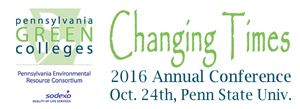
"Finding a Better Future in Changing Times: Energy, Environmentand Sustainability."
From the moment he agreed to serve as keynote speaker, we eagerly anticipated Richard Alley's talk. Dr. Alley is Evan Pugh University Professor of Geosciences at Penn State. He studies the great ice sheets to help predict future changes in climate and sea level,
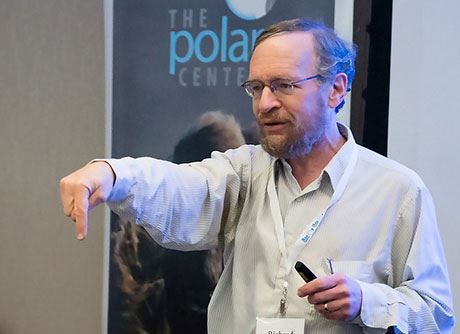 and has conducted three field seasons in Antarctica, eight in Greenland, and three in Alaska. He has been honored for research (including election to the US National Academy of Sciences and the Royal Society), teaching, and service. Dr. Alley participated in the UN Intergovernmental Panel on Climate Change (co-recipient of the 2007 Nobel Peace Prize) He was the host of the PBS series "Earth, the Operator's Manual." His popular account of climate change and ice cores, The Two-Mile Time Machine, was Phi Beta Kappa’s science book of the year. In addition to being the author of seven books, he has authored more than 240 refereed scientific publications about the relationship between Earth's cryosphere and global climate change. He is the recipient of a variety of honors and awards, including the Heinz Award, the BBVA Foundation Frontiers of Knowledge award and the National center for Science Education's Friend of the Planet award. In addition to the video of the entire keynote above, Richard's slide deck is available here.
and has conducted three field seasons in Antarctica, eight in Greenland, and three in Alaska. He has been honored for research (including election to the US National Academy of Sciences and the Royal Society), teaching, and service. Dr. Alley participated in the UN Intergovernmental Panel on Climate Change (co-recipient of the 2007 Nobel Peace Prize) He was the host of the PBS series "Earth, the Operator's Manual." His popular account of climate change and ice cores, The Two-Mile Time Machine, was Phi Beta Kappa’s science book of the year. In addition to being the author of seven books, he has authored more than 240 refereed scientific publications about the relationship between Earth's cryosphere and global climate change. He is the recipient of a variety of honors and awards, including the Heinz Award, the BBVA Foundation Frontiers of Knowledge award and the National center for Science Education's Friend of the Planet award. In addition to the video of the entire keynote above, Richard's slide deck is available here.
Putting a price on carbon: on the campus
Aurora Winslade, Sustainability Director, Swarthmore College
You may be aware of movements to place a price on carbon on a national level--one such strategy is the Fee and Dividend approach espoused by Citizens Climate Lobby. Are there ways to place a 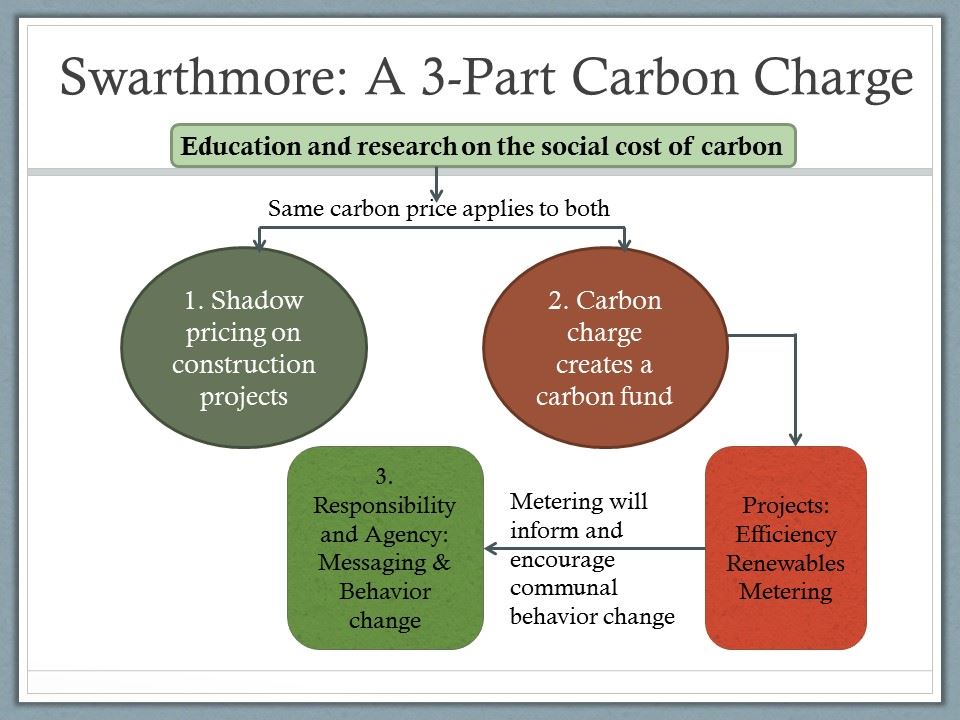 price on carbon in higher education? Several institutions across the country are implementing models that place a price on carbon on their campuses. Swarthmore College is one such college. This session explored carbon pricing both as a strategy to secure funding sustainability projects, and as a way for campuses to engage in the larger dialog about solutions to climate change. Aurora also shared some information about how Swarthmore’s carbon charge operates. This session was a preview of PERC’s daylong workshop on Carbon Pricing in Higher Education. That workshop will take place January 6th 2017 at Swarthmore College. Putting a price on carbon presentation.
price on carbon in higher education? Several institutions across the country are implementing models that place a price on carbon on their campuses. Swarthmore College is one such college. This session explored carbon pricing both as a strategy to secure funding sustainability projects, and as a way for campuses to engage in the larger dialog about solutions to climate change. Aurora also shared some information about how Swarthmore’s carbon charge operates. This session was a preview of PERC’s daylong workshop on Carbon Pricing in Higher Education. That workshop will take place January 6th 2017 at Swarthmore College. Putting a price on carbon presentation.
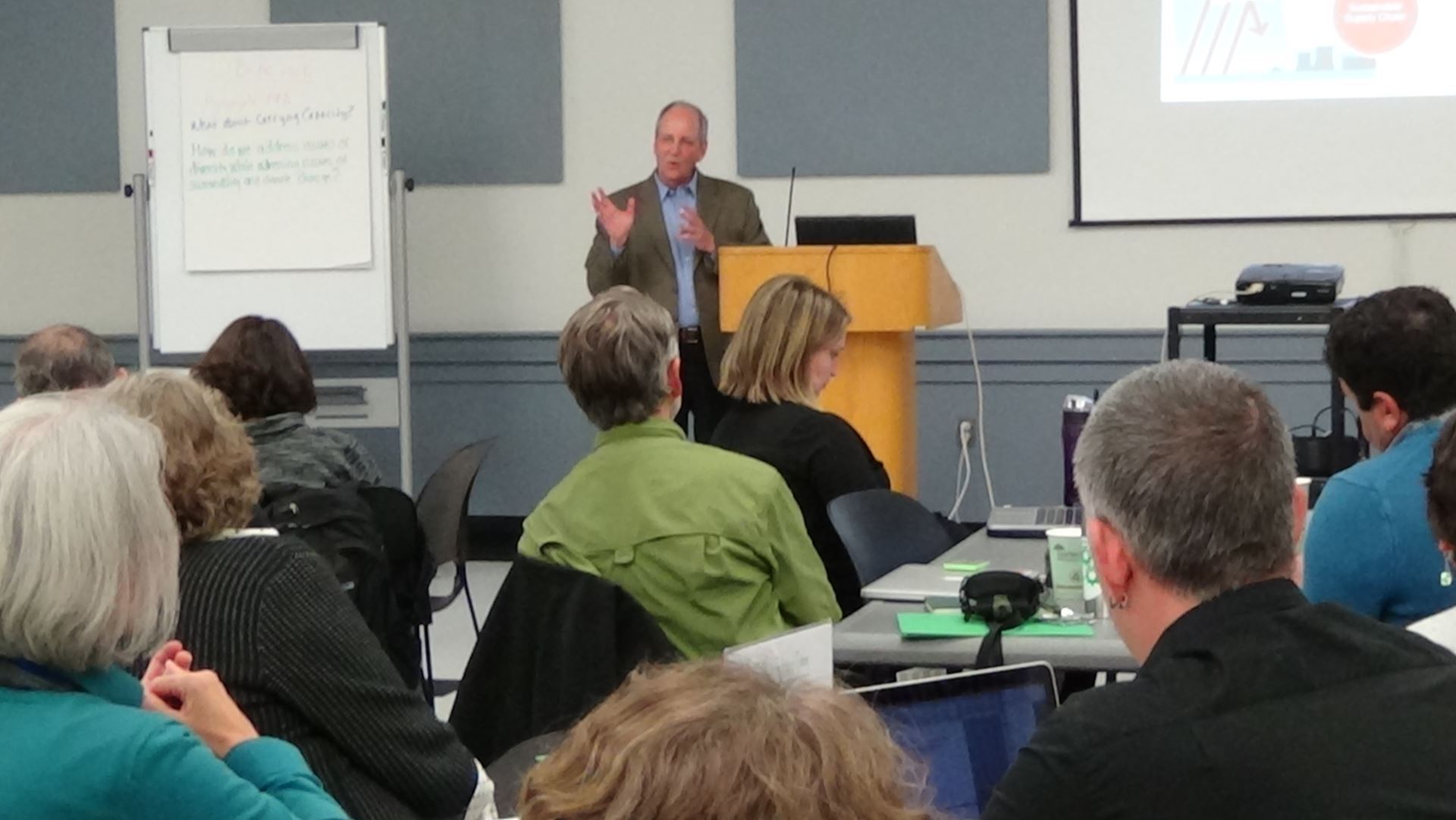 First, Sodexo's Jim Gurley took a look at Sodexo's commitment to zero food waste going to the landfill. Working in collaboration with clients, customers, suppliers, public and nonprofit organizations, Sodexo offers an actionable model for how the foodservice industry can significantly contribute to the national reduction of food waste, while also freeing up landfill space and reducing ozone-depleting methane gas emissions.
First, Sodexo's Jim Gurley took a look at Sodexo's commitment to zero food waste going to the landfill. Working in collaboration with clients, customers, suppliers, public and nonprofit organizations, Sodexo offers an actionable model for how the foodservice industry can significantly contribute to the national reduction of food waste, while also freeing up landfill space and reducing ozone-depleting methane gas emissions.
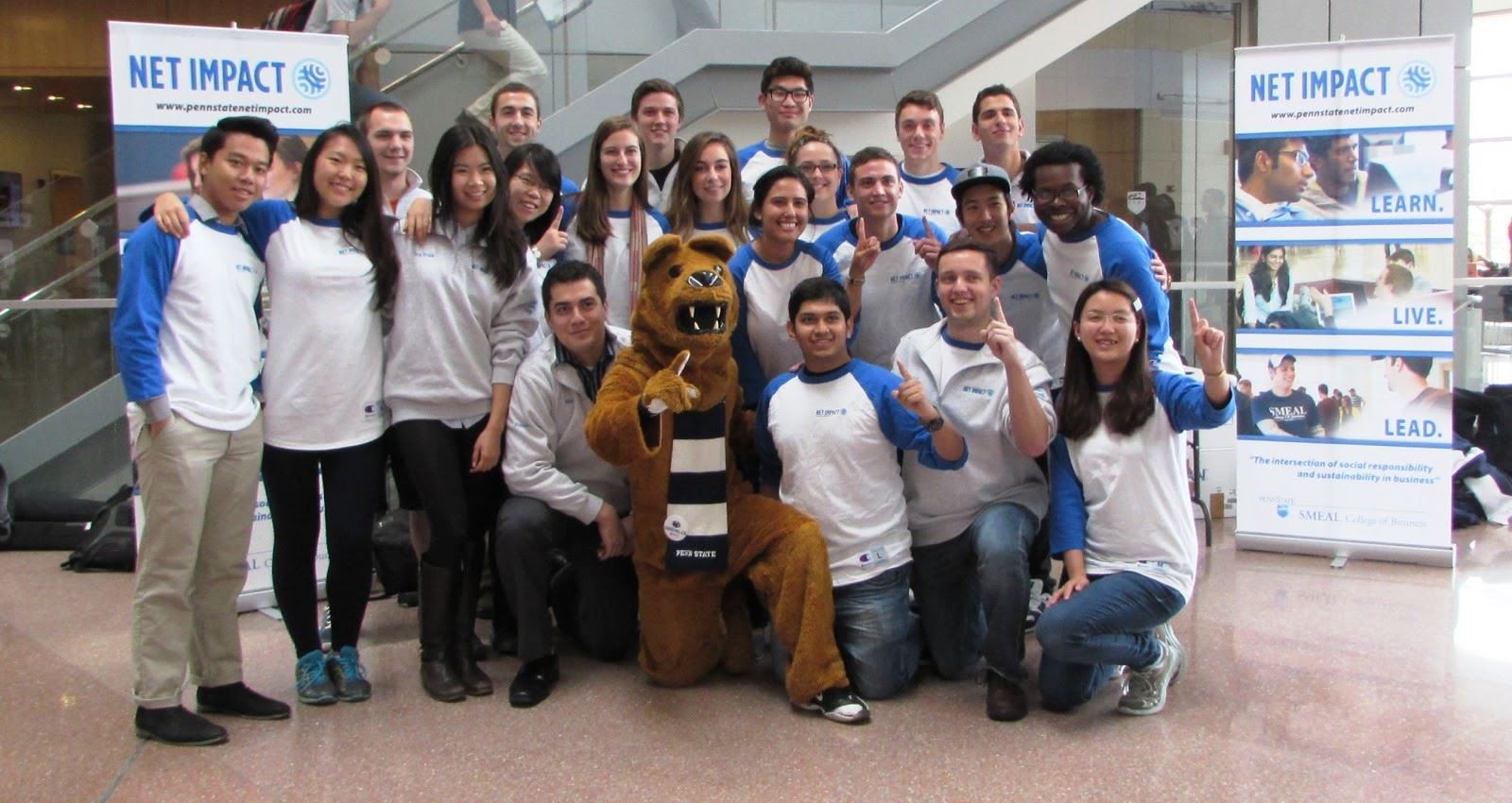
Net Impact Undergraduate is a business organization focused on bridging the gap between business, sustainability, CSR, and ethics. We teach students about those subject areas as well as working on projects that will positively impact the local community. Net Impact's president, Alec Raymond, gave us a glimpse at some of the work they do. Presentation: Net Impact.
Michael Walsh, Deputy Secretary
Pennsylvania Department of Conservation and Natural Resources (DCNR)
Peter Spadaro, Sustainability Fellow
Pennsylvania Department of Conservation and Natural Resources (DCNR)
 DCNR believes some of the best classrooms in Pennsylvania can be found in state parks and forests. Mike Walsh, Deputy Secretary for Administration at DCNR, and Peter Spadaro, Sustainability Program Fellow, talked about DCNR's Think Outside", an exciting new program developed to expand the learning landscape and connect higher education with the natural environment. Developed as part of an agency-wide sustainability initiative, “Think Outside” will help DCNR to advance sustainability across its operations while connecting with Pennsylvania’s higher education community.
DCNR believes some of the best classrooms in Pennsylvania can be found in state parks and forests. Mike Walsh, Deputy Secretary for Administration at DCNR, and Peter Spadaro, Sustainability Program Fellow, talked about DCNR's Think Outside", an exciting new program developed to expand the learning landscape and connect higher education with the natural environment. Developed as part of an agency-wide sustainability initiative, “Think Outside” will help DCNR to advance sustainability across its operations while connecting with Pennsylvania’s higher education community.
Host Highlight
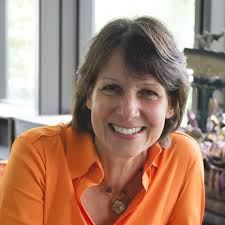 Denice Wardrop, Director, Penn State’s Sustainability Institute
Denice Wardrop, Director, Penn State’s Sustainability Institute
Reports Show How Renewables Can Close the Gap
on Climate Commitments
Hundreds of schools have committed to climate, energy, and sustainability goals. Two new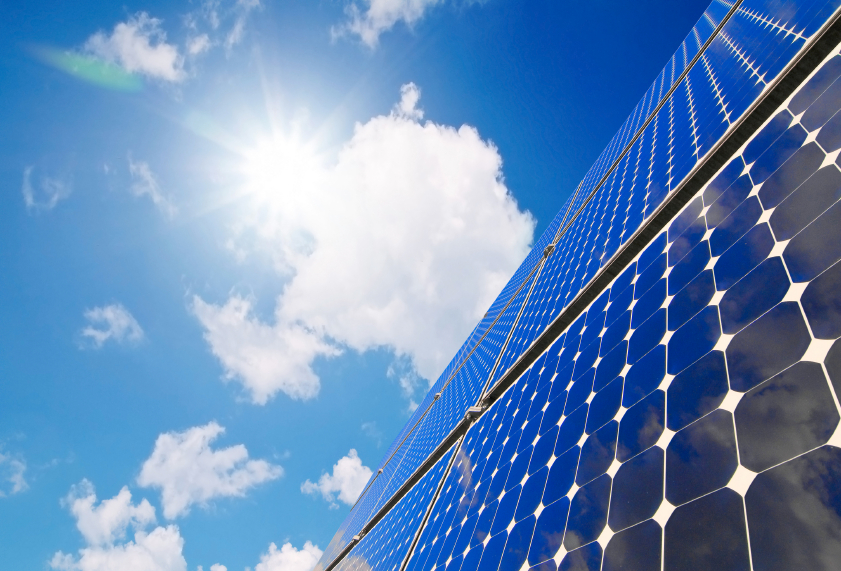 reports from the University of New Hampshire and the Intentional Endowments Network analyze progress on these goals. The findings are mixed. On the one hand, there is a large gap between the goals and the achievements for the higher education sector as a whole. But there are a growing number of individual success stories. Large-scale renewable energy is the common theme among those achieving their goals. And these successes are being made possible because they reduce costs and risks compared to business as usual. This presentation looks at the large scale renewable energy strategies that are succeeding.
reports from the University of New Hampshire and the Intentional Endowments Network analyze progress on these goals. The findings are mixed. On the one hand, there is a large gap between the goals and the achievements for the higher education sector as a whole. But there are a growing number of individual success stories. Large-scale renewable energy is the common theme among those achieving their goals. And these successes are being made possible because they reduce costs and risks compared to business as usual. This presentation looks at the large scale renewable energy strategies that are succeeding.
Presentation: Renewables Can Close the Climate Gap
Chris referred to this report from the Intentional Endowments Network.
 PERC's Campus Sustainability Champion designation is a statewide effort to recognize individuals who are doing commendable work on moving sustainability forward on their campuses and communities. Four of the 2016 CSC designees gave an overview of their work and answered questions about how their lessons learned might apply to your campus. Among the four designees were Penn State's John Roe, talking about his "Math for Sustainability" course that cleverly interweaves mathematical and sustainability concepts for non-STEM students and Ellie Ezekiel, an Animal Behavior major at Franklin and Marshall College whose sustainability work ranges widely from F&M's observation beehive to the "Green Cinema" film series and more, gave a presentation about an F&M project: the women's volleyball team elected to wear uniforms made of recycled materials.
PERC's Campus Sustainability Champion designation is a statewide effort to recognize individuals who are doing commendable work on moving sustainability forward on their campuses and communities. Four of the 2016 CSC designees gave an overview of their work and answered questions about how their lessons learned might apply to your campus. Among the four designees were Penn State's John Roe, talking about his "Math for Sustainability" course that cleverly interweaves mathematical and sustainability concepts for non-STEM students and Ellie Ezekiel, an Animal Behavior major at Franklin and Marshall College whose sustainability work ranges widely from F&M's observation beehive to the "Green Cinema" film series and more, gave a presentation about an F&M project: the women's volleyball team elected to wear uniforms made of recycled materials.
The Climate Crisis and Higher Ed
Don Brown, Widener University
With Peter Buckland, Penn State University, Dina El-Mogazi, Bucknell University, Aurora Winslade, Swarthmore College
This panel saw this moment as the beginning of a discussion of the role that higher ed can play in the climate crisis. The panel began with a look at the urgency of the situation presented by Dr. Brown, (see his presentation here) followed by thoughts from the panel members.Facilitaor: Jeremy Bean, Sustainability Institute, Penn State University


